|
|
|
Sort Order |
|
|
|
Items / Page
|
|
|
|
|
|
|
| Srl | Item |
| 1 |
ID:
091724
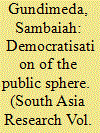

|
|
|
|
|
| Publication |
2009.
|
| Summary/Abstract |
Equality of treatment for all citizens and their cultures in public places is one of the prominent declarations of the secular Constitution of India. The hegemony of Hindu culture in the public sphere, however, reflects a dichotomy between stated declarations and social reality. Placing Dalits at the bottom of the caste hierarchy, if not outside it, 'mainstream' Hindu culture not only marginalised but importantly rejected the Dalits and their culture. This article examines the saga of the demand for a beef stall by the Dalit students in Hyderabad Central University and argues that the rejection of the culture of any community injures the human agency of that community. It is proposed that such injury can be healed only by a dialogical process, involving assertion of positivity and pride in the culture of the injured and positive recognition of such assertion by the injurer. Democratisation of the public sphere can be actualised by according representation to marginalised cultures, but in addition such representation needs to be accompanied with respect.
|
|
|
|
|
|
|
|
|
|
|
|
|
|
|
|
| 2 |
ID:
172534
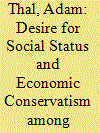

|
|
|
|
|
| Summary/Abstract |
Affluent Americans have disproportionate influence over policymaking and often use their power to advance conservative economic policies that increase inequality. I show that this behavior is partially driven by affluent Americans’ desire for social status. First, I use a new survey scale to show that affluent Americans’ desire for social status strongly predicts their level of economic conservatism. Second, I test my theory experimentally in the context of social media. On sites like Facebook, Instagram, and Twitter, affluent Americans compete for social status by sharing curated versions of their lives that highlight their upper-class lifestyle. When I randomly assign affluent Americans to experience this status competition, it causes them to become more economically conservative. The results help us understand the social and psychological origins of economic conservatism among affluent Americans, and provide the first evidence that social media encourages political behaviors that are conducive to inequality.
|
|
|
|
|
|
|
|
|
|
|
|
|
|
|
|
| 3 |
ID:
123763
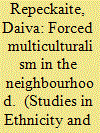

|
|
|
|
|
| Publication |
2013.
|
| Summary/Abstract |
Ethnic migration from the former Soviet Union to Israel is widely considered to be a 'laboratory of ethnicity'. Most of the research into this subject focuses on the cultural and linguistic factors of identity restructuring, whereas critical engagement with social status, class, and urban environment is a much newer development. Social, economic, and urban explanations of the remaining relevance of 'old' (ex-USSR) identifications are particularly needed in the face of increasing alienation among various disadvantaged groups in Israel and the mobilization of large numbers of Russian-speakers around nationalist political parties. On the basis of interviews, participant observations, and media analysis, this article argues that simultaneously deterritorialized and reterritorialized ideas of home and belonging shape this group's social and political mobilization patterns in contested city spaces. Further, I suggest that nationalist mobilization is a strategy to reach beyond ethno-politics and make majority rather than minority claims.
|
|
|
|
|
|
|
|
|
|
|
|
|
|
|
|
| 4 |
ID:
151475
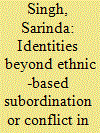

|
|
|
|
|
| Summary/Abstract |
This paper explores everyday expressions of identity by Lao villagers living in northeast Cambodia near the border with Laos, and uses this to reflect on trends in studies of identity in the remote borderlands of Southeast Asia. I argue that while ethnicity is certainly crucial, discipline-specific emphases – ethnic-based subordination or conflict for social studies and political studies, respectively – result in less attention to other important dynamics shaping identity. Furthermore, I suggest that low-profile case studies not strongly linked to ethnic-based subordination or conflict – such as the Lao in Cambodia – require study for a more comprehensive view of identity in the borderlands. The case study from northeast Cambodia identifies four key dynamics shaping identity: inter-state relations, ethno-national identities, cross-border livelihoods and social status. I show how minimal inter-state tensions and varied personal connections to Laos were important in facilitating villagers’ involvement in lucrative illegal cross-border logging in Laos, but the latter were never used to justify this practice. Instead in this everyday setting, villagers emphasised their sense of marginalisation within Cambodia and thus demonstrate their regular prioritisation of status.
|
|
|
|
|
|
|
|
|
|
|
|
|
|
|
|
| 5 |
ID:
185053
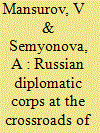

|
|
|
|
|
| Summary/Abstract |
THE SCHOLARLY value of the historical-biographical reference book The Last Diplomats of the Russian Empire: 1900-1917, prepared by career diplomat minister counselor second class Yury Ivanov and sociologist Yelena Ivanova* cannot be overestimated. It is a rich source of information about the Russian diplomats who served at the turn of the 20th century, during World War I and the revolutionary transformations in Russia. The collected material is valuable to researchers studying the history of diplomatic service, as well as to those interested in the history of Russian emigration. The book contains a trove of factual material indispensable for sociological studies of the specifics of professional groups and their emergence. Its scholarly value is unique: The material, professionally presented in compact form, immerses readers in the social and political problems of an entire generation of Russian diplomats while also providing information about the fates of individual diplomats.
|
|
|
|
|
|
|
|
|
|
|
|
|
|
|
|
| 6 |
ID:
159028


|
|
|
|
|
| Summary/Abstract |
This study first investigates determinants of job searching strategies and then examines if social networks are connected with better job outcomes. Unlike previous studies that focus solely on income, this paper pays more heed to job satisfaction. Based on data drawn from China General Social Survey, we find that disadvantaged job seekers rely primarily on informal channels; whereas experienced and better-educated job seekers tend to search for jobs through formal channels. However, those reaping the largest benefit from using networks are the job seekers who are able to use formal and informal channels jointly. By disaggregating the whole sample, we further find that the promoting effect of network use is contingent on factors such as gender and types of jobs. Network use brings about larger benefits to female and job seekers target to prestigious occupations. Finally, it appears that whether a job seeker can receive influential help depends primarily on the social status of the contacts rather than their tie strength. The results of our paper thus urge us to examine the combination of different searching strategies rather than studying them separately.
|
|
|
|
|
|
|
|
|
|
|
|
|
|
|
|
| 7 |
ID:
037626
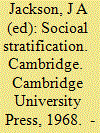

|
|
|
|
|
| Publication |
Cambridge, Cambridge University Press, 1968.
|
| Description |
ix, 238p.
|
| Series |
Sociological Studies, no. 1
|
|
|
|
|
|
|
|
|
|
|
|
Copies: C:1/I:0,R:0,Q:0
Circulation
| Accession# | Call# | Current Location | Status | Policy | Location |
| 002696 | 305.5/JAC 002696 | Main | On Shelf | General | |
|
|
|
|
| 8 |
ID:
178177
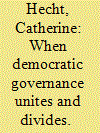

|
|
|
|
|
| Summary/Abstract |
Scholars and practitioners are increasingly attentive to contestation against symbols and institutions underpinning international order(s). Yet International Relations scholarship can benefit from greater understanding of ways in which contestation interacts with salient dimensions of social status in specific international organizations (IOs). Drawing on evidence from the history of the Organization for Security and Co-operation in Europe (OSCE), with a focus on democratic governance and human rights, this article analyzes status-related contestation as a significant, yet under-examined type of contestation in multilateral diplomacy. Status-related contestation conveys dissatisfaction about symbols, institutions, and actors which reinforce socially significant divisions that place a state (or group of states) at a social disadvantage in a particular multilateral venue. International organizations provide unique social contexts which affect the content of contestation. Building on scholarship in social psychology, constructivism, and status hierarchies in world politics, the article analyzes the evolution of a dimension (or basis) of social status in the OSCE and illustrates that, beyond domestic and material interests, state representatives communicate social identity-related concerns through language, for example, that expresses discontent with dividing lines, unfairness, or (dis)respect, in attempting to minimize negative social identities in multilateral organizations.
|
|
|
|
|
|
|
|
|
|
|
|
|
|
|
|
| 9 |
ID:
157479
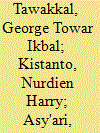

|
|
|
| 10 |
ID:
129557
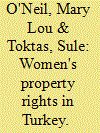

|
|
|
|
|
| Publication |
2014.
|
| Summary/Abstract |
This article takes Turkey as a case study, exploring marital and inheritance regimes with regard to their impact on women and their ability to protect women's property rights. The aim of the study is to bring to light the workings of the legal system that regulate the acquisition of property and to scrutinize the gap between the law and its practice in Turkish society. By taking this approach, the article does not only focus on laws but also on how these laws are adopted by society. Thus, two levels of analysis-de jure and de facto-are utilized for an investigation of women's property rights and hence their social and economic status.
|
|
|
|
|
|
|
|
|
|
|
|
|
|
|
|
|
|
|
|
|